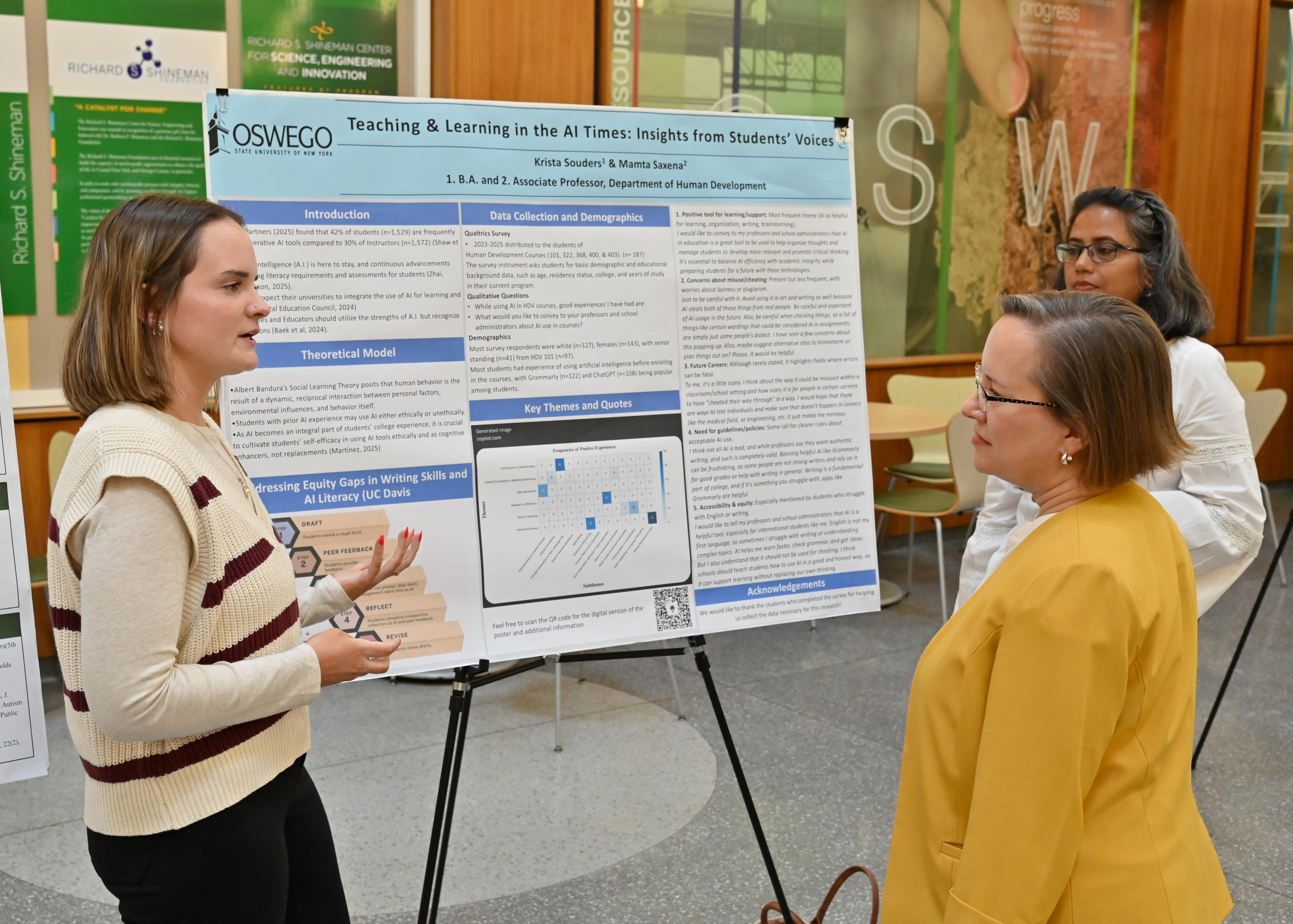Senior human development major Krista Souders presents her research poster “Teaching and Learning in the AI Times: Insights From Students’ Voices” at the university’s Fall Poster Symposium to Kristin Croyle, dean of the College of Liberal Arts, Sciences and Engineering. Sounders conducted the research with faculty mentor Mamta Saxena (left), associate professor of human development.
SUNY Oswego senior human development major Krista Souders is examining how students are using the expanding field of artificial intelligence (AI) in their coursework –- as well as their concerns about use of the technology.
Earlier this semester, Sounders presented her work, “Teaching and Learning in the AI Times: Insights From Students’ Voices” at the university’s Fall Poster Symposium. Her project, conducted alongside advisor Mamta Saxena, associate professor of human development, is building on ongoing efforts to understand AI’s role in student learning.
“We are working to find what students are wanting from AI and how AI is going to impact future college careers,” Souders said.
Souders joined the project in the spring 2025 after being invited by Saxena, who began collecting survey responses from her classes in 2023. Saxena said she developed the survey out of interest to understand how AI shapes student learning outcomes in her courses.
“It explores the frequency and types of generative AI tools used by human development undergraduates,” Saxena said. “I wanted to understand whether integration of AI in course content was complicating their learning process or academic growth, or if it was simplifying it and empowering them.”
The Qualtrics survey gathered 187 responses from students across several human development courses. According to Souders, the findings emphasized a growing need for clarified guidelines regarding appropriate AI use, something students echoed in both the data and in Souders’ conversations with faculty during the symposium.
“After doing a qualitative analysis, we found that a lot of students find it as a positive tool for learning,” Souders said. “But there were also a lot of concerns about misuse and cheating through AI.”
Based on student responses, the research outlined five key themes related to AI: support tools for learning, concerns about misuse, career implications, campus policy concerns and equity issues. Many students also expressed concern about inconsistent expectations across different classes and departments, something Saxena says is worth looking into for a coordinated institutional response.
“We need clearer course-level policies and guidance on what constitutes acceptable AI use to develop a coherent understanding of ethical AI practices,” Saxena said.
‘Amazing’ experience
Presenting the project at the poster symposium was a major moment for Souders, who said it was her first time sharing research in a formal setting. She described the experience as “amazing” and said speaking with faculty from several departments helped her understand how AI conversations differ across disciplines.
Souders credits much of her academic growth to the human development major that takes a multidisciplinary approach and explores an individual’s development through numerous intersecting lenses. After initial struggles adjusting to the university setting, she shared that switching to the major set her up for success.
“It allowed me to flourish as a student,” Souders said. “The faculty does a really good job of listening to their students and helping their students as much as they possibly can. I’ve gotten a few 4.0s, and the confidence that I got from that has really allowed me to be in the academic presence that I currently am in.”
Her confidence grew when she became a teaching assistant for HDV 101, an introductory course taught by Saxena. She worked closely with students and actively contributed to classroom activities.
“It was completely different to see it on the other side,” she said. “Being able to work with students up close and give them insight about my experiences and work collaboratively with the professor was a really great opportunity.”
After graduation, Souders plans to pursue mental health counseling and hopes to continue conducting research in graduate school. She is particularly interested in working with adolescents and is also considering substance abuse counseling after completing an internship in that area.
Saxena said Souders’ dedication and professionalism throughout the project reflect the strengths she hopes all human development students carry into their careers.
“Krista was really good and has the drive to succeed academically,” Saxena said. “Even though she was given short notice, she enthusiastically completed the literature review and analysed the data for the presentation.”
Reflecting on her journey, Souders encourages other students, not just human development students, to take advantage of research opportunities when they arise.
“Research is amazing. Being able to dive deep into something and produce data or even just produce information is very important,” she said. “Definitely pursue it if you have the time.”
-- Written by Emma Kerl of the Class of 2026




